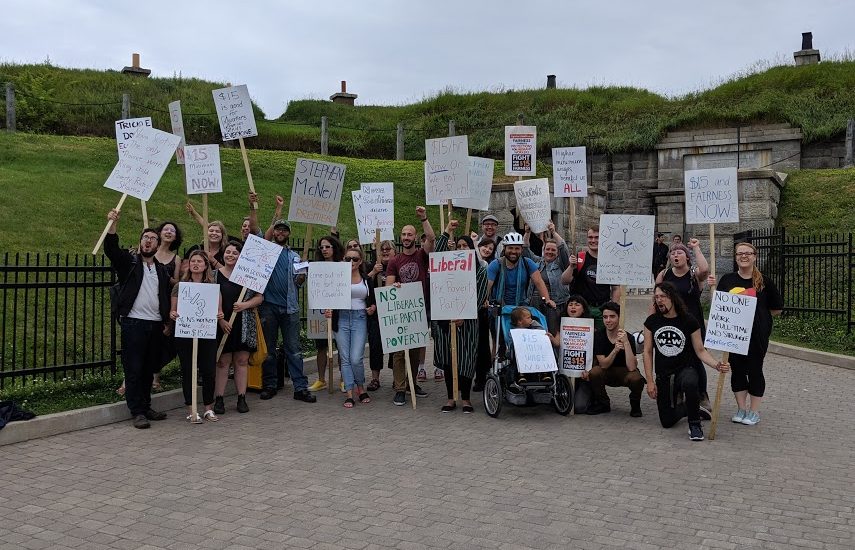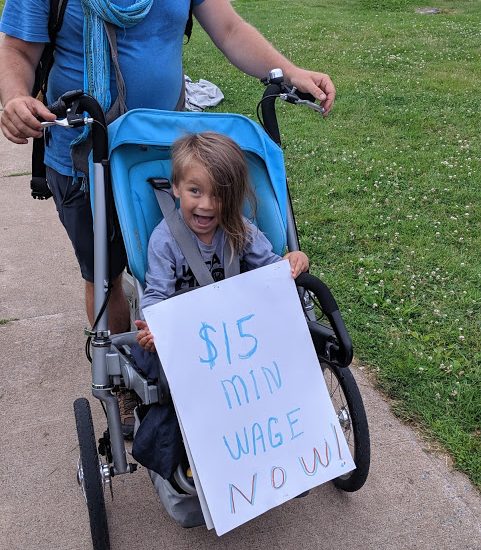This article was first published in the excellent RandkandFile.ca. Republished with the kind permission of RankandFile and the author

KJIPUKTUK (Halifax) – On April 1st, 2020, Nova Scotia’s minimum wage will increase to $12.55 per hour. Up by $1, this is the largest annual minimum wage increase the province has seen since 2010.
Credit for the minimum wage increase is due, in large part, to the Fight for $15 and Fairness campaign; a grassroots movement that champions higher wages and improvements to provincial labour standards across the country.
See also: Photo view: Fight for 15 activists picket provincial Liberals’ fundraiser
The campaign’s push for better wages also resulted in the elimination of the inexperienced minimum wage in Nova Scotia, which allows employers to pay workers 50 cents less per hour during their first 3 months on the job. Nova Scotia will be the last province to eliminate this distinction.
$12.55 is not enough

Despite the recent success of the campaign in Nova Scotia, its members argue that $12.55 is still inadequate. “A livable wage in Halifax is $19 per hour,” says Stephen Wentzell, organizer with Halifax’s own Fight for $15 and Fairness chapter. “For the average person, this is what it would cost just to make ends meet” he says. “A livable wage means living a life of dignity.”
While $19 per hour constitutes a livable wage in Halifax, the campaign sees $15 as a starting point.
In 2017, the number of Nova Scotians earning less than $15 per hour accounted for over a quarter of Nova Scotia’s workforce. 32.6% of those workers were aged 35 and up, despite the assumption that most minimum wage earners are young people supplementing financial support they receive from their parents.
“If you, as a business owner, cannot pay your workers a livable wage then you shouldn’t be allowed to run a business”, says Wentzell.
Liberals cut partial hours pay
What is also concerning is that, in exchange for the dollar-per-hour increase, minimum wage earners in Nova Scotia are losing wages earned for partial hours worked.
The partial-hour rule requires employers to round-up time worked by their minimum wage employees. For example, if an employee works 15 minutes past the end of their shift, they must be compensated for the full half-hour.
“When you are living below the poverty line, every dollar counts,” says Wentzel. “Many of us already give so much unpaid time to our bosses. This change means that more time will go uncompensated, and contributes to a sense of entitlement business owners have over their employees.”
The loss of the partial-hour rule will take effect on the same day as the minimum wage increase.
“When vulnerable workers have to make financial sacrifices for a minor raise in their wages, progress is undermined,” says Wentzell. “McNeil is taking care of business owners at the expense of workers. This move sends a strong message to Nova Scotians.”
Phony fearmongering from business
As expected, the announcement of Nova Scotia’s minimum wage increase has been met with dramatic doom-and-gloom predictions by the local business community, who threaten lay-offs, job losses, hour-reductions, and even business closures in response.
Despite several incremental increases to Nova Scotia’s minimum wage, and the accompanying fearmongering by the local business community, the province’s labour force has in fact been on a four-year upward trend since 2016. The provincial unemployment rate continues to drop, resting at 7.2% in 2019, down from 7.5% in 2018 and 8.4% in 2017.
Further, in 2019, the overall number of new jobs posted online in Nova Scotia increased by 12%. This is despite a 55 cent minimum wage increase that year, which was met with similar resistance from reactive business owners. Notably, job postings in the sales and services industry (the industry that employs the most minimum wage workers) increased by 15.4%.
“When workers do well, businesses do well,” says Wentzell. “When the poor see an increase in their wages, the money is invested directly back into the local economy. This, in turn, creates jobs and increases business revenue, which is exactly what the evidence supports.”
The fight continues

Nova Scotia’s Minister of Labour and Advanced Education, Labi Kousoulis, says the increase will result in almost $2,000 more a year for full-time workers. While a step in the right direction, the increase still leaves minimum wage workers in Halifax earning $6.45 per hour less than what their basic needs require.
“The progress of the minimum wage increase has come at a cost for workers in the province.So, this is a partial victory,” says Wentzell. “We should celebrate the raise while placing pressure on policymakers until we get the fairness we deserve.”
As low-wage workers in Nova Scotia continue to be undervalued by the businesses they sustain, the fight for decent wages continues.
To learn more, check out the Halifax Fight for 15 and Fairness website, or contact the Halifax-Workers Action Centre, info@halifaxworkersaction.ca (902) 221-0755, www.halifaxworkersaction.ca
With a special thanks to our generous donors who make publication of the Nova Scotia Advocate possible.
Subscribe to the Nova Scotia Advocate weekly digest and never miss an article again. It’s free!



